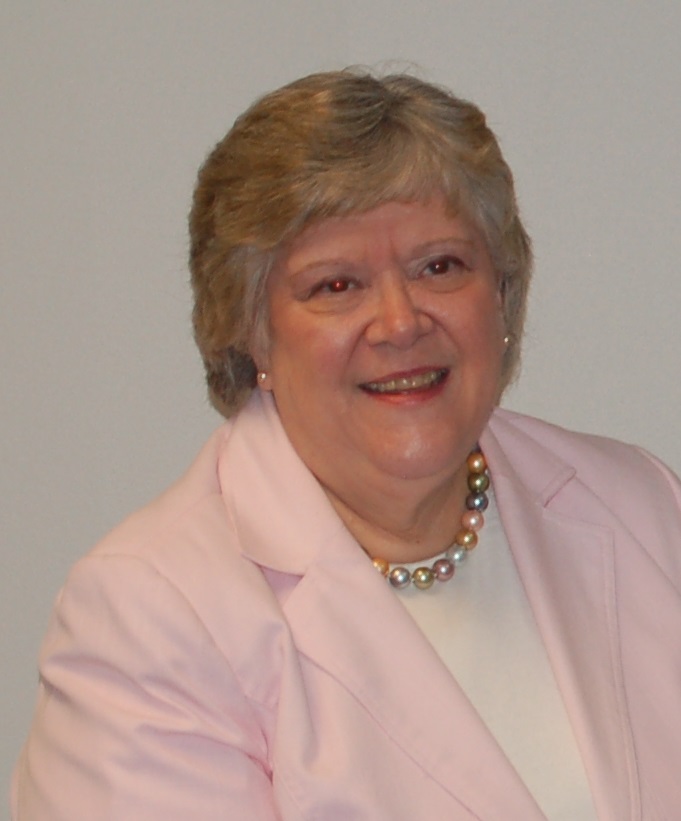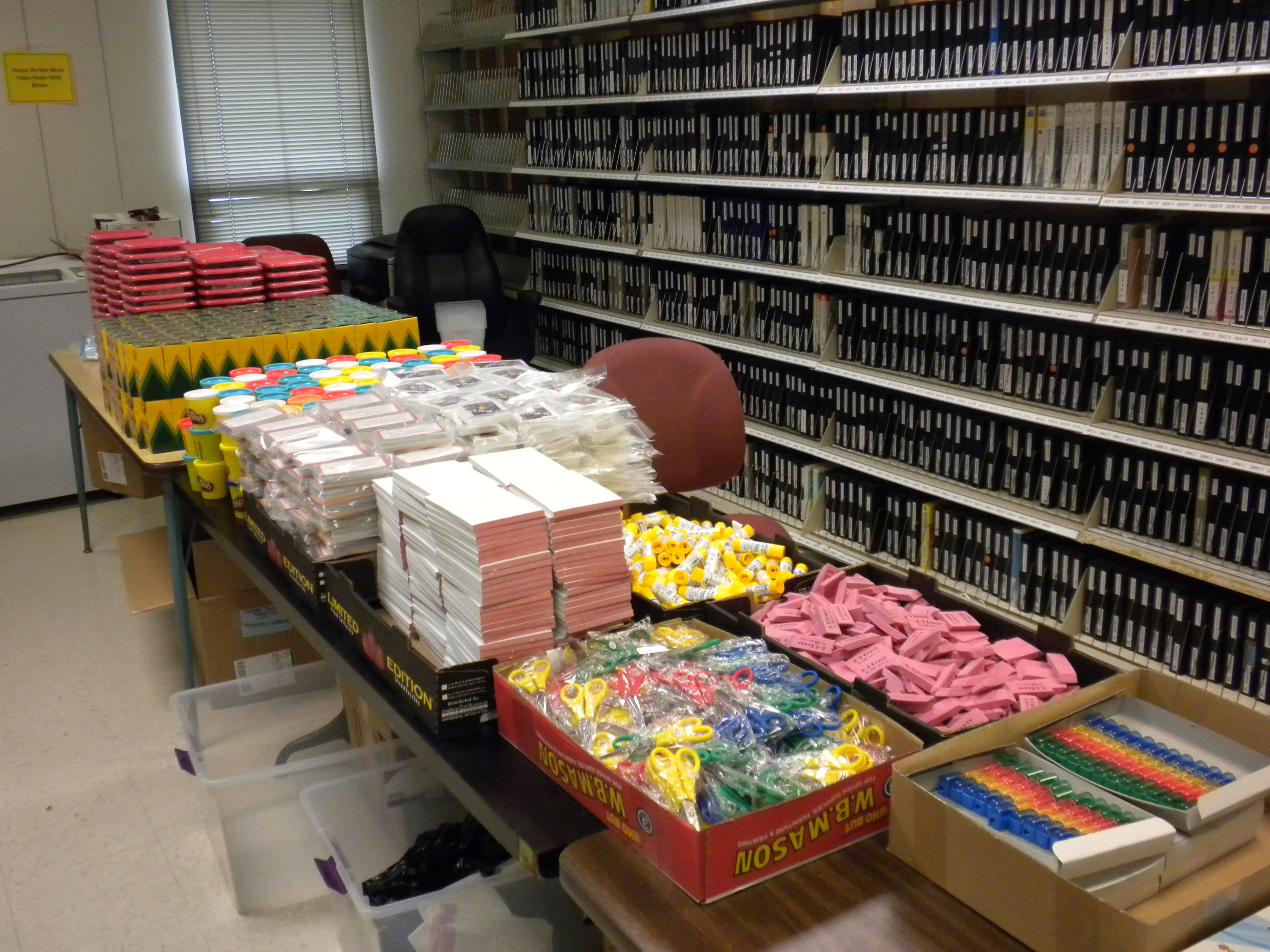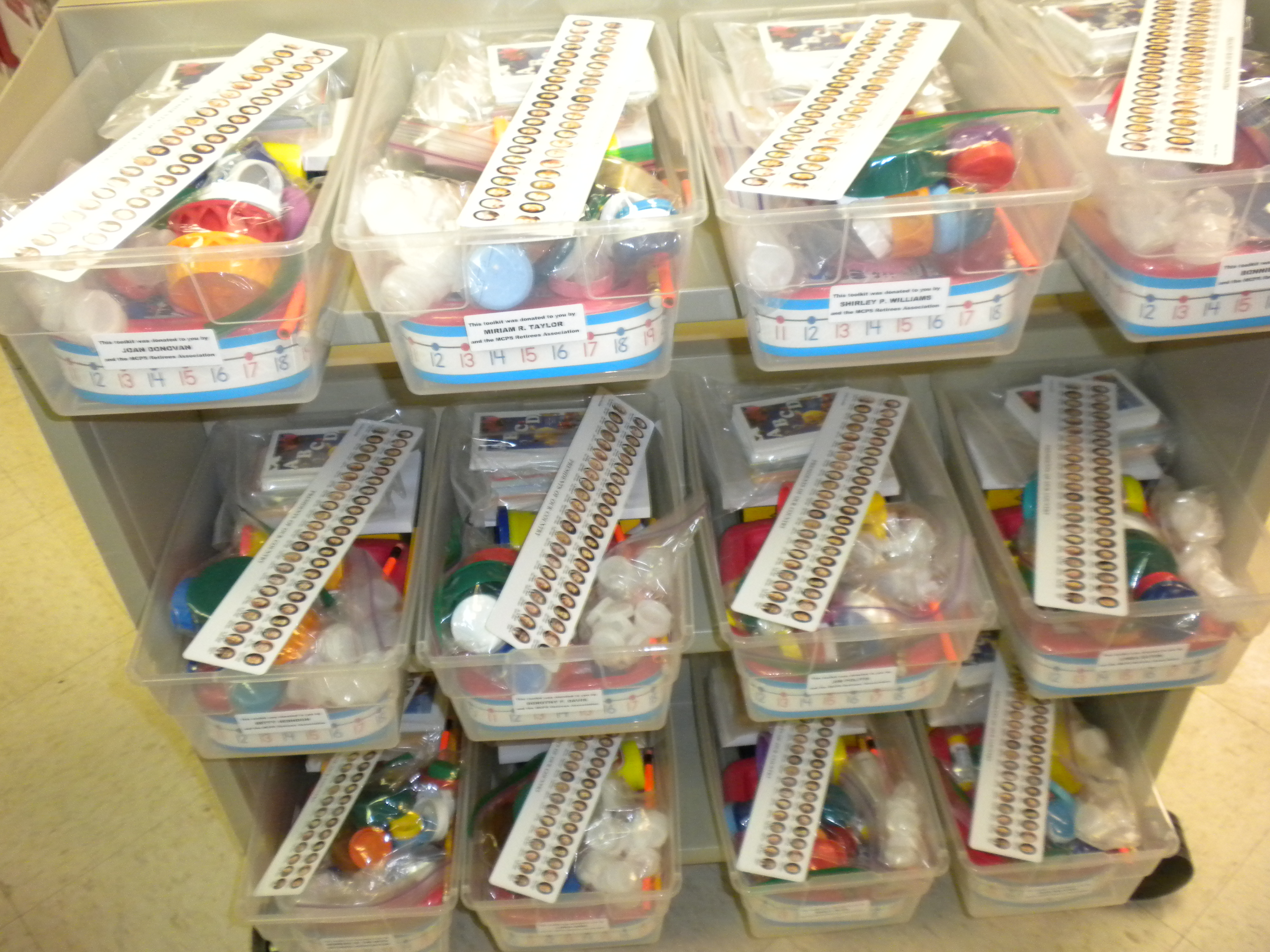 Joan Donovan retired in 2004 after teaching fourth grade at Laytonsville Elementary School for 35 years. Her relationship with the school and MCPS has never ended: she still substitute teaches and helps fundraise for the Toolkits, Books, and Backpacks Project run by the MCPS Retiree Association. The Toolkits Project, which launched in 2003, helps economically disadvantaged kindergartners who attended the Title I Extended Learning Opportunities Summer Adventures in Learning (ELO SAIL) Program at approximately 25 to 30 school sites each summer. The toolkits contain most of the school supplies that kindergartners need to have at home to support their learning at school. Over the last 12 years, the program has donated over 14,000 toolkits to MCPS students.
Joan Donovan retired in 2004 after teaching fourth grade at Laytonsville Elementary School for 35 years. Her relationship with the school and MCPS has never ended: she still substitute teaches and helps fundraise for the Toolkits, Books, and Backpacks Project run by the MCPS Retiree Association. The Toolkits Project, which launched in 2003, helps economically disadvantaged kindergartners who attended the Title I Extended Learning Opportunities Summer Adventures in Learning (ELO SAIL) Program at approximately 25 to 30 school sites each summer. The toolkits contain most of the school supplies that kindergartners need to have at home to support their learning at school. Over the last 12 years, the program has donated over 14,000 toolkits to MCPS students.
Q: What is your involvement with the Toolkits campaign? Why did you get involved?
Shortly after retiring in 2004, I joined the MCPS Retirees Association, and learned of the association's initiative to provide toolkits of school supplies to economically challenged Title I summer school kindergartners. When I retired and walked out of my classroom for the last time, I did not leave behind my love for nor my commitment to the children of Montgomery County. I knew that there must be something out there that I could champion to continue to be a contributor to the well-being and education of children and here it was! The project had only been in existence for one year when I joined the association's Special Projects Committee. I assisted in assembling the approximately 850 kits that year. I then helped co-chair the project in 2005 when the Books component was added to provide each Title I summer school child in grades 1 - 5 with a gently used book. We collected, sorted, and distributed close to 5,000 gently used books that summer. Since 2006, I have served as the main chairperson of the Special Projects Committee. This project over the years has grown dramatically in scope, magnitude, and need. This past summer we assembled and distributed 1,432 toolkits!
Q: Why did you decide to stay connected with MCPS post-employment or what inspired you to stay connected?
I have always been proud to be a teacher in a county where education was considered a top priority and its school system was top-rated throughout the entire country. It was a difficult decision to retire because I so wanted to somehow continue to touch the future by investing some of my new-found "free" time assisting children in the learning process. As a substitute teacher I could widen by teaching experience by working with children in all grades, Kindergarten through Fifth Grade, which I have enjoyed immensely. By joining the MCPS Retirees Association I have been able to share additional energies and talents to the benefit of not only retired school personnel but for children countywide.

Q. What exactly is the toolkits campaign?
The Toolkits Project was first initiated by MCPSRA in 2003 at the request of then MCPS Superintendent Dr. Jerry Weast to help economically disadvantaged kindergartners who attend the Title I Extended Learning Opportunities Summer Adventures in Learning (ELO SAIL) Program at approximately 25 to 30 school sites each summer. The toolkits contain most of the school supplies that kindergartners need to have at home to support their learning at school such as magnetic letters, crayons, scissors, pencils and sharpeners, erasers, rulers, glue sticks, paper, ABC cards, math cards, number lines, 100s charts, math counters, and even lesson plans for parents to use with their children. Parents are invited to attend an in-service session at each ELO SAIL school site to help them make the best use at home of each of the items and lessons contained in these toolkits. In 2005 the Books component was added to provide gently used books for the Title I summer school students in grades 1 - 5 so that each of them would have a book to take home to keep at summer's end. We now try to purchase new books for the students in one or more grade levels rather than collect gently used books, which did not always provide us with enough or age appropriate books. We can provide books each summer only if our fundraising efforts are successful enough to permit us to do so. The Backpacks component was added in 2007 at the request of the Title I summer school coordinators to provide backpacks of school supplies and books for homeless children from non-Title I schools who are invited to attend the ELO SAIL Program each summer. Again, we can only provide these if enough funds are raised. Over the 12 years of the project's existence, we have assembled and distributed nearly 14,000 kindergarten toolkits, collected and distributed thousands of gently used books as well as purchased and given to needy summer school children 8,800 new books, and provided over 225 backpacks of school supplies to homeless children.
Q: How much money have you raised for the toolkits campaign?
Fundraising each year is by far the most challenging aspect of the entire Toolkits, Books, and Backpacks Project. From the meager $3,600 raised during its first year in 2003, the amount needed to assure the project's complete success each year now has risen enormously to nearly $33,000. The need for our project has never been greater due to the fact that there are more and more families in our county experiencing economic hardships. Through the generosity of 335 individuals as well as a few corporations who sponsored toolkits with their donations we were able to raise enough money to pay for the 1432 toolkits last summer. The cost for those alone was nearly $22,000. We were unable to purchase new books or backpacks this past year. Thus far since our new fundraising campaign started in September we have received about $6,000. Our anxieties regarding fundraising escalate as we approach the time when decisions must be made in mid-March in order to complete the project in early July. We would be most grateful for any assistance you could provide us so that we can do all three components of our project this coming summer.

Q: How long have you been a part of the campaign?
I have been involved with the Toolkits, Books, and Backpacks Project since 2004 when I retired. It has become almost a 40 hour a week job coordinating the fundraising, collecting, sorting, and bagging over 60,000 plastic bottle caps of various sizes and colors to go in the toolkits as math counters, and then assembling the nearly 1500 kits with the 19 items that go in each one.
Q: Why is the toolkits campaign important or valuable to the MCPS community, to you?
I have always known that in every school district and in every community across this nation there are many, many children from families that experience the misfortune of living with the hardships of poverty and need. But I had no concept just how many families right here in Montgomery County face this every day until I really got involved with this project. People have to know how devastating it is to these parents when their children get their school supply lists in the fall and they have no means to go out and buy these supplies. The children not only need but deserve to have the supplies necessary at home to support their learning at school. They are entitled to the same chance as any other child in our school system. Every child is special! "Somebody must have thought I was special!" said one little boy to me as I handed him his kit and told him that someone had donated the money just so he could get one. That's why this project is important to me and most especially to the children we have dedicated our lives to serve. Our future as well as theirs depends on how committed we are to their education and well-being today.
